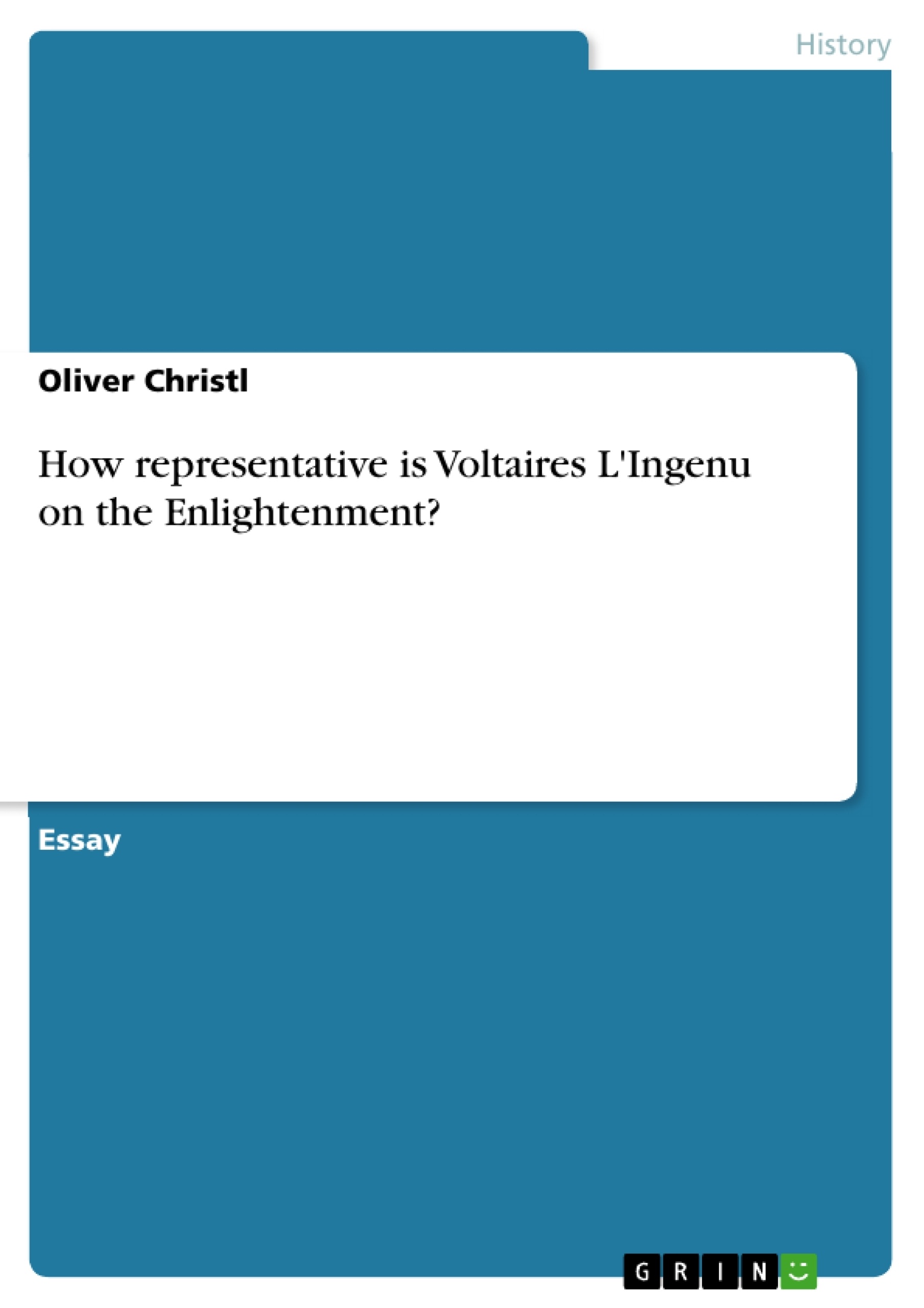The intellectual movement of the Enlightenment developed a rational and scientific approach to religious, social, political, and economic issues. The major representatives of this philosophy tried to discover valid principles governing humanity, nature, and society. They attacked spiritual and scientific authority, dogmatism, intolerance and censorship. One of the most prominent Enlightenment philosophers was François-Marie Arouet, better known by the pen-name Voltaire.
This essay tries to point out how representative Voltaire’s L’Ingénu is on the Enlightenment.
Therefore, in examining three major concepts of the Enlightenment that are found in the novel, the investigation first focuses on the representation of the idea of freedom, then on the novel’s criticism on Christianity and, finally, on Voltaire’s elaboration on the concept of Nature in connection with the civilized society.
II. The Concept of Freedom
The Enlightenment was a constant fight for personal liberty, legal equality and the freedom of thought and expression. Voltaire has found his ideal of freedom by observing political life in his time and by comparing the different forms of government existing in theory. In the Europe of those days he thought this ideal to be realized best in the English constitution, as it provided a concrete protection for every citizen’s possessions and personal security. Being successful in transferring the ideas of freedom he has experienced in the English society to France, Voltaire has greatly influenced the French Enlightenment movement. The appraisal of the English society also found its way into his novel L’Ingénu. After having arrived at the French coast, the protagonist L’Ingénu, a Huron, meets the Abbé de Kerkabon and his sister Mademoiselle de Kerkabon, who are soon determined to baptize the young man. L’Ingé is astonished and annoyed by this attempt to influence his believes and simply tells his hosts, that “in England everyone was allowed to live as he liked” and that he would leave the following day. At another occasion, when L’Ingénu is unjustly thrown into prison, he exclaims: “Are there no laws in this country, that men are condemned without a hearing? It’s not like that in England.”
The concept of freedom is mentioned in many ways throughout the novel, for example by the unjust imprisonment of L’Ingénu and Gordon, or, when L’Ingénu’s love St Yves lies on her deathbed telling her lover: “I die with the consolation of knowing you
Table of Contents
- I. Introduction
- II. The Concept of Freedom
- III. The Criticism on Christianity
- IV. The Concept of Nature and the Civilized Society
Objectives and Key Themes
This essay aims to demonstrate the representativeness of Voltaire's "L'Ingénu" in reflecting Enlightenment ideals. By examining three central concepts of the Enlightenment found in the novel, the analysis explores the representation of freedom, the criticism of Christianity, and Voltaire's elaboration on the concept of Nature in relation to civilized society.
- The concept of freedom and its connection to the English constitution
- Voltaire's criticism of the church and its institutions
- The role of Nature and the impact of civilization on human nature
- The importance of reason and rationality in the Enlightenment
- The tension between individual liberty and societal norms
Chapter Summaries
The first chapter introduces the Enlightenment movement and its key figures, highlighting Voltaire's significance within this context. The essay then focuses on the concept of freedom, analyzing its representation in Voltaire's "L'Ingénu" through the character of the Huron protagonist, who contrasts the constraints of French society with the freedom he experienced in England.
Chapter three delves into Voltaire's critique of Christianity, showcasing his satirical portrayal of the church and its institutions. The chapter examines how "L'Ingénu" highlights the hypocrisy and contradictions within Christianity, as well as its influence on societal norms and individual freedom.
The fourth chapter explores the concept of Nature and its impact on human nature in Voltaire's novel. The essay examines how "L'Ingénu," as a "Child of Nature," embodies the purity and potential of human nature, uncorrupted by the constraints of civilization. The chapter also analyzes how the protagonist's experiences in France highlight the potential for human development and growth through reason and knowledge.
Keywords
The primary focus of this essay is on the Enlightenment era, Voltaire, "L'Ingénu," freedom, Christianity, Nature, civilized society, and the human condition. These themes are explored through the lens of Voltaire's philosophical insights and satirical approach, highlighting the tension between individual liberty and societal constraints, as well as the importance of reason and rationality in shaping human development.
Frequently Asked Questions
How does Voltaire's L'Ingénu represent Enlightenment ideals?
The novel reflects core Enlightenment themes such as personal liberty, the use of reason, criticism of religious dogma, and the contrast between nature and civilization.
What is Voltaire's critique of Christianity in the novel?
Voltaire uses satire to highlight the hypocrisy and intolerance of the 18th-century French church, often contrasting religious rules with natural morality and common sense.
Why does the protagonist compare France to England?
L'Ingénu notes that in England, "everyone was allowed to live as he liked," reflecting Voltaire's admiration for the English constitution and its protection of individual freedom.
What does the concept of "Nature" mean in L'Ingénu?
The protagonist, as a "Child of Nature" (a Huron), represents human purity and logic uncorrupted by social prejudices, serving as a mirror to the absurdities of "civilized" society.
What role does reason play in the protagonist's development?
While initially naive, L'Ingénu uses his natural reason to learn quickly, showing that enlightenment comes from a combination of innate logic and acquired knowledge.
- Citation du texte
- Oliver Christl (Auteur), 2005, How representative is Voltaires L'Ingenu on the Enlightenment?, Munich, GRIN Verlag, https://www.grin.com/document/131982



